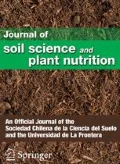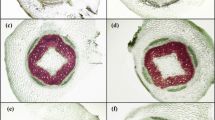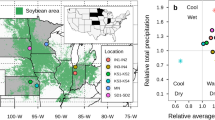Abstract
The main objective of our study was to evaluate the effectiveness of Trichoderma viride BHU-2953 as a single inoculant during seed-priming to enhance phosphorus (P) uptake in soybean. A pot experiment was conducted, taking six treatments, in a completely randomized block design to assess the P uptake, root length, apparent phosphorus recovery (APR), rhizospheric phosphatase activity, pH, soil-P status, dehydrogenase activity, and fungal colony-forming unit (CFU g−1) in three different soybean growth stages through seed-priming with T. viride along with graded fertilizer P-doses. Significantly (P < 0.05) higher soil phosphatase activity, dehydrogenase activity, CFU of T. viride, and P-content in soybean vegetative parts were observed in bio-primed treatments as compared to control and RDF (full recommended dose of P-fertilizer without seed-priming), while seed-P (%), APR (%), and root lengths of RDF were found significantly (P < 0.05) lower than bio-primed soybeans with 90% RDF but were at par with 80% RDF. Higher positive correlations between CFU and acid phosphatase (R2 = 0.89, 0.9, and 0.89; P < 0.05) and between CFU and alkaline phosphatase activities (R2 = 0.98, 0.96, and 0.97; P < 0.05) at 30, 50, and 75 DAS indicate that T. viride mediated higher soil phosphatase activities. Higher P-recoveries of bio-primed soybeans, received 90% and 80% RDF, were achieved mainly due to soil applied-P solubilization through enhanced acid phosphatase activities along with better soil exploration by plant roots. Thus, seed-priming with T. viride BHU-2953 can reduce up to 20% of the recommended P-dose in soybeans.

Similar content being viewed by others
References
Afzal S, Tariq S, Sultana V, Ara J, Ehteshamul-Haque S (2013) Managing the root diseases of okra with endo-root plant growth-promoting Pseudomonas and Trichoderma viride associated with healthy okra roots. Pak J Bot 45(4):1455–1460
Bender RR, Haegele JW, Below FE (2015) Nutrient uptake, partitioning, and remobilization in modern soybean varieties. Agron J 107(2):563–573. https://doi.org/10.2134/agronj14.0435
Björkman T (2004) Effect of Trichoderma colonization on auxin-mediated regulation of root elongation. Plant Growth Regul 43(1):89–92. https://doi.org/10.1023/B:GROW.0000038260.85276.82
Bray RH, Kurtz LT (1945) Determination of total, organic, and available forms of phosphorus in soils. Soil Sci 59(1):39–46
Devika OS, Paul S, Sarkar D, Rajput RS, Singh S, Parihar M, Parewa HP, Pal S, Singh HB, Rakshit R (2019) Trichoderma: a part of possible answer towards crop residue disposal. J Appl Nat Sci. https://doi.org/10.31018/jans.v11i2.2090
Dickman SR, Bray RH (1940) Colorimetric determination of phosphate. Ind Eng Chem Anal Ed 12:665–668. https://doi.org/10.1021/ac50151a013
Dixit AK, Tomar DS, Saxena A (2009) Performance of soybean variety JS95-60 under real farm conditions in Malwa plateau of Madhya Pradesh. Soybean Res 7:64–72
Druzhinina IS, Seidl-Seiboth V, Herrera-Estrella A, Horwitz BA, Kenerley CM, Monte E, Mukherjee PK, Zeilinger S, Grigoriev IV, Kubicek CP (2011) Trichoderma: the genomics of opportunistic success. Nat Rev Microbiol 9(10):749–759. https://doi.org/10.1038/nrmicro2637
Elad Y, Chet I, Henis Y (1981) A selective medium for improving quantitative isolation of Trichoderma spp. from soil. Phytoparasitica 9(1):59–67. https://doi.org/10.1007/BF03158330
Fageria NK, Baligar VC (2005) Enhancing nitrogen use efficiency in crop plants. Adv Agron. https://doi.org/10.1016/S0065-2113(05)88004-6
FAI ─ Fertiliser Association of India (2019) 64th annual report 2018-19. FAI House, New Delhi, India
Gai Z, Zhang J, Li C (2017) Effects of starter nitrogen fertilizer on soybean root activity, leaf photosynthesis and grain yield. PLoS One 12:e0174841. https://doi.org/10.1371/journal.pone.0174841
Han J, Shi J, Zeng L, Xu J, Wu L (2015) Effects of nitrogen fertilization on the acidity and salinity of greenhouse soils. Environ Sci Pollut Res 22(4):2976–2986. https://doi.org/10.1007/s11356-014-3542-z
Harman GE, Howell CR, Viterbo A, Chet I, Lorito M (2004) Trichoderma species—opportunistic, avirulent plant symbionts. Nat Rev Microbiol 2(1):43–56. https://doi.org/10.1038/nrmicro797
He Z, Wu C, Shen J, Gao Y, Chang L, Gao Z (2018) Effects of Trichoderma asperellum bio-fertilizer on cucumber Fusarium wilt and microbial population in continuous cucumber cropping rhizosphere soil. J Plant Prot 45(3):528–535
Jackson ML (1973) Methods of chemical analysis. Prentice-Hall of India (Pvt.) Ltd., New Delhi
Janegitz MC, Souza EAD, Rosolem CA (2016) Brachiaria as a cover crop to improve phosphorus use efficiency in a no-till Oxisol. Rev Bras Ciência Solo 40:e0150128. https://doi.org/10.1590/18069657rbcs20150128
Julia C, Wissuwa M, Kretzschmar T, Jeong K, Rose T (2016) Phosphorus uptake, partitioning and redistribution during grain filling in rice. Ann Bot 118(6):1151–1162. https://doi.org/10.1093/aob/mcw164
Klein DA, Loh TC, Goulding RL (1971) A rapid procedure to evaluate the dehydrogenase activity of soils low in organic matter. Soil Biol Biochem 3(4):385–387
Krishnapriya V, Pandey R (2016) Root exudation index: screening organic acid exudation and phosphorus acquisition efficiency in soybean genotypes. Crop Pasture Sci 67(10):1096–1109. https://doi.org/10.1071/CP15329
Kunze A, Costa MD, Epping J, Loffaguen JC, Schuh R, Lovato PE (2011) Phosphatase activity in sandy soil influenced by mycorrhizal and non-mycorrhizal cover crops. Rev Bras Ciência Solo 35(3):705–711. https://doi.org/10.1590/S0100-06832011000300005
Lalitha P, Arunalakshmi K (2012) Effect of Trichoderma viride on germination of mustard and survival of mustard seedlings. Int J Life Sci Biotechnol Pharm Res 1(1):137–140
Lombardi N, Vitale S, Turrà D, Reverberi M, Fanelli C, Vinale F, Marra R, Ruocco M, Pascale A, d’Errico G, Woo SL (2018) Root exudates of stressed plants stimulate and attract Trichoderma soil fungi. Mol Plant-Microbe Interact 31(10):982–994. https://doi.org/10.1094/MPMI-12-17-0310-R
Mahato S, Bhuju S, Shrestha J (2018) Effect of Trichoderma viride as biofertilizer on growth and yield of wheat. Malays J Sustain Agric 2(2):1–5. https://doi.org/10.26480/mjsa.02.2018.01.05
Malhotra H, Sharma S, Pandey R (2018) Phosphorus nutrition: plant growth in response to deficiency and excess. In: Hasanuzzaman M, Fujita M, Oku H, Nahar K, Hawrylak-Nowak B (eds) Plant nutrients and abiotic stress tolerance. Springer, Singapore, pp 171–190
Marklein AR, Houlton BZ (2012) Nitrogen inputs accelerate phosphorus cycling rates across a wide variety of terrestrial ecosystems. New Phytol 193(3):696–704. https://doi.org/10.1111/j.1469-8137.2011.03967.x
Meena SK, Rakshit A, Meena VS (2016) Effect of seed bio-priming and N doses under varied soil type on nitrogen use efficiency (NUE) of wheat (Triticum aestivum L.) under greenhouse conditions. Biocatal Agric Biotechnol. https://doi.org/10.1016/j.bcab.2016.02.010
Meena VS, Meena SK, Verma JP, Kumar A, Aeron A, Mishra PK, Bisht JK, Pattanayak A, Naveed M, Dotaniya ML (2017) Plant beneficial rhizospheric microorganism (PBRM) strategies to improve nutrients use efficiency: a review. Ecol Eng 107:8–32. https://doi.org/10.1016/j.ecoleng.2017.06.058
Nannipieri P, Giagnoni L, Landi L, Renella G (2011) Role of phosphatase enzymes in soil. In: Bünemann E, Oberson A, Frossard E (eds) Phosphorus in action, Soil Biol, vol 26. Springer, Berlin, Heidelberg, pp 215–243
Omara AE, Hauka F, Afify A, El-Din MN, Kassem M (2017) The role of some PGPR strains to biocontrol Rhizoctonia solani in soybean and enhancement the growth dynamics and seed yield. Environ Biodivers Soil Secur 1:47–59. https://doi.org/10.21608/jenvbs.2017.993.1003
Paul S, Chatterjee N, Bohra JS, Singh SP, Dutta D, Singh RK, Rakshit A (2019) Soil health in cropping systems: an overview. In: Hasanuzzaman M (ed) Agronomic crops. Springer, Singapore, pp 45–66
Penn CJ, Camberato JJ (2019) A critical review on soil chemical processes that control how soil pH affects phosphorus availability to plants. Agric. https://doi.org/10.3390/agriculture9060120
Qiao Y, Miao S, Han X, Yue S, Tang C (2017) Improving soil nutrient availability increases carbon rhizodeposition under maize and soybean in Mollisols. Sci Total Environ 603-604:416–424. https://doi.org/10.1016/j.scitotenv.2017.06.090
Rakshit A, Sunita K, Pal S, Singh A, Singh HB (2015) Bio-priming mediated nutrient use efficiency of crop species. In: Rakshit A, Singh HB, Sen A (eds) Nutrient use efficiency: from basics to advances. Springer, New Delhi, pp 181–191
Razaq M, Zhang P, Shen HL (2017) Influence of nitrogen and phosphorous on the growth and root morphology of Acer mono. PLoS One 12(2):e0171321. https://doi.org/10.1371/journal.pone.0171321
Saini I, Yadav K, Aggarwal A (2019) Response of arbuscular mycorrhizal fungi along with Trichoderma viride and Pseudomonas fluorescens on the growth, biochemical attributes and vase life of Chrysanthemum indicum. J Environ Biol 40(2):183–191. https://doi.org/10.22438/jeb/40/2/MRN-848
Shahid M, Singh A, Srivastava M, Sachan CP, Biswas SK (2011) Effect of seed treatment on germination and vigour in chickpea. Trends Biosci 4(2):205–207
Singh N, Singh G (2016) Response of lentil (Lens culinaris Medikus) to phosphorus-a review. Agric Rev 37(1):27–34 http://10.0.73.117/ar.v37i1.9261
Singh HB, Singh A, Sarma BK, Upadhyay DN (2014) Trichoderma viride 2% WP (strain no. BHU-2953) formulation suppresses tomato wilt caused by Fusarium oxysporum f. sp. lycopersici and chilli damping-off caused by Pythium aphanidermatum effectively under different agroclimatic conditions. Int J Agric Environ Biotechnol 7(2):313–320. https://doi.org/10.5958/2230-732X.2014.00249.6
Soil Survey Staff (2014) Keys to soil taxonomy, 12th edn. USDA-Natural Resources Conservation Service, Washington, DC
Spohn M, Kuzyakov Y (2013) Distribution of microbial-and root-derived phosphatase activities in the rhizosphere depending on P availability and C allocation–coupling soil zymography with 14C imaging. Soil Biol Biochem 67:106–113. https://doi.org/10.1016/j.soilbio.2013.08.015
Sureshrao KS, Pradeeprao KT, Dnyanobarao GS, Agrawal T, Kotasthane AS (2016) Root growth stimulation in rice (Oryza sativa L.) by seed bio-priming with Trichoderma sp. Appl Biol Res 18(1):30–38. https://doi.org/10.5958/0974-4517.2016.00005.7
Tabatabai MA, Bremner JM (1969) Use of p-nitrophenyl phosphate for assay of soil phosphatase activity. Soil Biol Biochem 1(4):301–307. https://doi.org/10.1016/0038-0717(69)90012-1
Tanwar A, Aggarwal A, Kaushish S, Chauhan S (2013) Interactive effect of AM fungi with Trichoderma viride and Pseudomonas fluorescens on growth and yield of broccoli. Plant Prot Sci 49(3):137–145. https://doi.org/10.17221/54/2012-PPS
Tawaraya K, Horie R, Shinano T, Wagatsuma T, Saito K, Oikawa A (2014) Metabolite profiling of soybean root exudates under phosphorus deficiency. Soil Sci Plant Nutr 60(5):679–694. https://doi.org/10.1080/00380768.2014.945390
Tennant D (1975) A test of a modified line intersect method of estimating root length. J Ecol 63(3):995─1001. https://www.jstor.org/stable/2258617
Velmourougane K, Prasanna R, Singh S, Chawla G, Kumar A, Saxena AK (2017) Modulating rhizosphere colonisation, plant growth, soil nutrient availability and plant defense enzyme activity through Trichoderma viride─Azotobacter chroococcum biofilm inoculation in chickpea. Plant Soil 421(1-2):157–174. https://doi.org/10.1007/s11104-017-3445-0
Vengavasi K, Pandey R (2018) Root exudation potential in contrasting soybean genotypes in response to low soil phosphorus availability is determined by photo-biochemical processes. Plant Physiol Biochem 124:1–9. https://doi.org/10.1016/j.plaphy.2018.01.002
Walkley A, Black IA (1934) An examination of the Degtjareff method for determining soil organic matter, and a proposed modification of the chromic acid titration method. Soil Sci 37(1):29–38
Wang AS, Angle JS, Chaney RL, Delorme TA, McIntosh M (2006) Changes in soil biological activities under reduced soil pH during Thlaspi caerulescens phytoextraction. Soil Biol Biochem 38(6):1451–1461. https://doi.org/10.1016/j.soilbio.2005.11.001
Wang X, Xu S, Wu S, Feng S, Bai Z, Zhuang G, Zhuang X (2018) Effect of Trichoderma viride biofertilizer on ammonia volatilization from an alkaline soil in Northern China. J Environ Sci 66:199–207. https://doi.org/10.1016/j.jes.2017.05.016
Yadav A, Aggarwal A (2015) The associative effect of arbuscular mycorrhizae with Trichoderma viride and Pseudomonas fluorescens in promoting growth, nutrient uptake and yield of Arachis hypogaea L. N Y Sci J 8(1):101–108
Yadav A, Yadav K, Aggarwal A (2015) Impact of Arbuscular Mycorrhizal Fungi with Trichoderma viride and Pseudomonas fluorescens on growth, yield and oil content in Helianthus annuus L. J Essent Oil Bear Plants 18(2):444–454. https://doi.org/10.1080/0972060X.2014.971066
Yadav RS, Singh V, Pal S, Meena SK, Meena VS, Sarma BK, Singh HB, Rakshit A (2018) Seed bio-priming of baby corn emerged as a viable strategy for reducing mineral fertilizer use and increasing productivity. Sci Hortic 241:93–99. https://doi.org/10.1016/j.scienta.2018.06.096
Yamaji N, Takemoto Y, Miyaji T, Mitani-Ueno N, Yoshida KT, Ma JF (2017) Reducing phosphorus accumulation in rice grains with an impaired transporter in the node. Nat 541(7635):92–95. https://doi.org/10.1038/nature20610
Zhang S, Gan Y, Xu B (2015) Biocontrol potential of a native species of Trichoderma longibrachiatum against Meloidogyne incognita. Appl Soil Ecol 94:21–29. https://doi.org/10.1016/j.apsoil.2015.04.010
Zhang D, Zhang H, Chu S, Li H, Chi Y, Triebwasser-Freese D, Lv H, Yu D (2017) Integrating QTL mapping and transcriptomics identifies candidate genes underlying QTLs associated with soybean tolerance to low-phosphorus stress. Plant Mol Biol 93(1-2):137–150. https://doi.org/10.1007/s11103-016-0552-x
Zhang F, Huo Y, Xu X, Hu J, Sun X, Xiao Y, Zhang Y (2018) Trichoderma improves the growth of Leymus chinensis. Biol Fert Soil 54(6):685–696. https://doi.org/10.1007/s00374-018-1292-7
Zhou T, Du Y, Ahmed S, Liu T, Ren M, Liu W, Yang W (2016) Genotypic differences in phosphorus efficiency and the performance of physiological characteristics in response to low phosphorus stress of soybean in southwest of China. Front Plant Sci 7. https://doi.org/10.3389/fpls.2016.01776
Acknowledgements
The authors would like to thank Prof. H. B. Singh, former Head of the Department, Department of Mycology and Plant Pathology, Institute of Agricultural Sciences, Banaras Hindu University, Varanasi, for providing Trichoderma viride strain no. BHU-2953 and Head, Department of Soil Science and Agricultural Chemistry, Institute of Agricultural Sciences, Banaras Hindu University, Varanasi, for necessary facilities to conduct this experiment.
Author information
Authors and Affiliations
Corresponding author
Ethics declarations
Conflict of Interest
The authors declare no competing interests.
Additional information
Publisher’s note
Springer Nature remains neutral with regard to jurisdictional claims in published maps and institutional affiliations.
Rights and permissions
About this article
Cite this article
Paul, S., Rakshit, A. Effect of Seed Bio-priming with Trichoderma viride Strain BHU-2953 for Enhancing Soil Phosphorus Solubilization and Uptake in Soybean (Glycine max). J Soil Sci Plant Nutr 21, 1041–1052 (2021). https://doi.org/10.1007/s42729-021-00420-4
Received:
Accepted:
Published:
Issue Date:
DOI: https://doi.org/10.1007/s42729-021-00420-4




